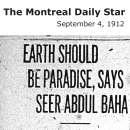Main menu
- ‘Abdu’l-Bahá’s Journey
- World Peace
- Stopping Racism in America
- Empowerment of Women
- More Principles...
- Prayer for America
Earth Should Be Paradise, Says Seer ‘Abdu’l-Bahá
Tells Socialists About His Scheme for a General Distribution of Wealth.
UPHOLDS DISTINCTIONS IN PEOPLE’S SOCIAL POSITION
But Says All Should Pay Tithes Graduated According to the Net Income.
That poverty could and should be abolished, and that every member of the great human family, without exception, had a right to live in comfort and happiness by sharing in the general welfare, was declared by ‘Abdu’l-Bahá, to be the economic expression of his teaching, in an address delivered last night to a gathering of Socialists in Coronation Hall, St. Lawrence st.
About five hundred people were present, many of them women, and they seemed to represent almost every nationality under the sun. Mr. H. A. Goulden presided, and he welcomed ‘Abdu’l-Bahá as a great messenger of love and brotherhood from the East to the West. The title of ‘Abdu’l-Bahá’s address was: “The Economic Happiness of the Human Race.”
Man Essentially Gregarious.
“All phenomena seemingly can live solitary and alone,” he said. “Trees, animals, and herds can live the solitary life. But man cannot. He is necessarily ever in need of co-operation and mutual help.
“In reality, all mankind represent one family. God desired that each individual member of the body politic should live in the utmost comfort and welfare.
“If all do not so enjoy life, there is a lack of symmetry in the body politic.
Individuals Share in General Weal.
“‘Let us look after ourselves,’ the selfish say. Let others die; so long as I am comfortable, everything is going well. Such a callous attitude is due to a lack of control and a lack of a working law.
‘Abdu’l-Bahá then outlined a scheme which had been formulated by Bahá’u’lláh, the great Bahá’í prophet, for ensuring the economic happiness of the people. The farmers were the first to be dealt with, for the agricultural industry was the most important and most useful in the national life. In every village community there was to be a general storehouse, to which a number of revenues would come. This income for the general income would include tithes, a certain revenue from the number of animals, and one-third from mines and materials. If anyone died without an heir, all his wealth went to the general storehouse. Any treasure trove picked up became public property.
Advocates Tithe System.
The tithes were to be collected from the farmers on a graded scale. If a man’s expenditure equaled his income, he would pay nothing; if one had an expenditure of one thousand dollars and an income of two thousand, he would pay one-tenth; from one having an income of ten thousand dollars and expenses of one thousand, two-tenths would be exacted. If one had an income of twenty thousand dollars and his expenses were two thousand, the taxes would amount to one-fourth. If the income was two hundred thousand dollars and the expenses ten thousand, then the community would exact just one-half.
From this general storehouse, the less fortunate members of the community would draw to secure their share of the general welfare. If a man’s expenses were ten thousand dollars and his income five thousand, he drew five thousand dollars from the store to even up.
Would Abolish Poverty.
There would be no poverty in the community. Orphans, cripples, the poor and the aged, the blind, the half deaf, all would be looked after. The people themselves would elect trustees for the administration of the public trust. Whatever surplus there might be, after all were looked after, would go to the national exchequer. For big cities, such a system would be carried out on, of course, a much more extensive scale.
By this system, said ‘Abdu’l-Bahá, every member of the body politic would live in comfort, without fear, and without being under obligation to any one.
Upholds Social Distinctions.
Degrees or grades would not be abolished. These were necessary, as in an army it was necessary to have marshals, generals, colonels, sergeants and foot soldiers. But, notwithstanding grades, all had the right to share in the general well-being.
“The earth can be made a paradise. Let all the servants of God ever strive that such a great happiness may be accrued to the world of humanity.”
Prolonged applause greeted ‘Abdu’l-Bahá at the close of his address. To-night he will speak at 716 Pine avenue west, and to-morrow night he will speak in St. James Methodist Church.









